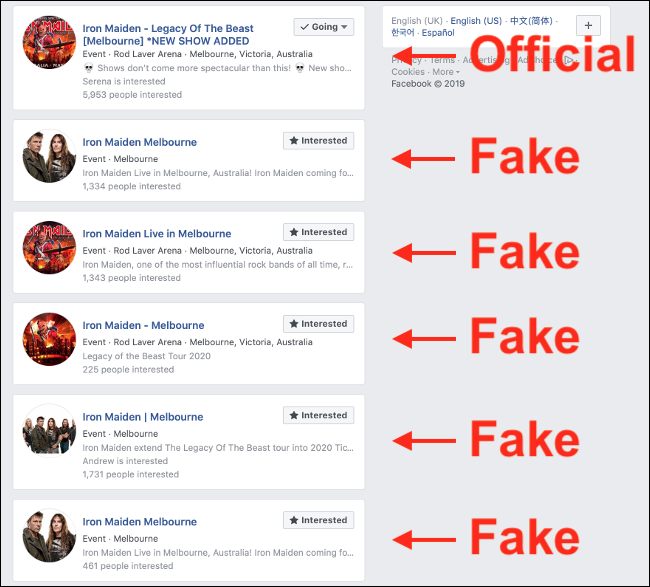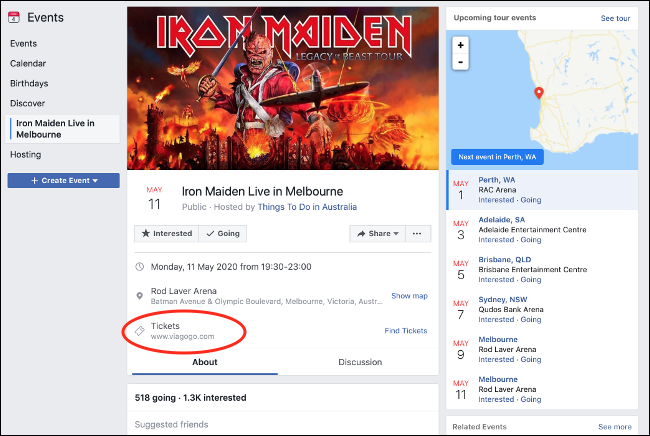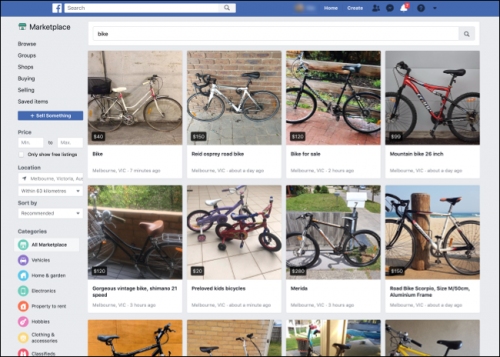Unlike spam emails in the late 90s and early 2000s, Facebook scams can be more difficult to detect. They hide and recycle old tactics while there are many who cry.

Do not let yourself or anyone you care about fall into Facebook scams. Find out what to look for and stay safe.
Facebook Fishing
Phishing is the impersonation of a service to get a target to provide credentials connections. While Facebook phishing is ultimately no different than any other type of phishing, it's important because some of the other scams on this list rely heavily on compromised accounts.
Most e-fishing takes place via email when a scammer sends a message asking the target to log in to their account, retrieve their password, or verify their account information. When you click on this link, the target is taken to a site that looks a lot like Facebook, but is actually hosted elsewhere. You can detect a scam, by looking at the address bar of your browser. If anything other than "facebook.com" is mentioned, then it is a scam.

Facebook also doesn't send often alerts asking them users to verify their accounts. If you haven't logged in for years, your Facebook account won't require any action from you to keep it active. Even if you suspect an alert is legitimate, you should visit Facebook.com directly instead of following a link emailed to you, just to be safe.
Because Facebook is a social network, your friends influence your behavior when using the service. If you see that a trusted friend or family member liked you on a page, shared a post, or suggested a service on the platform, you are much less likely to be deceived unless your friend has been deceived.
Post wrenches of your Facebook account, a scammer has access to your complete list of friends. It can see who you text and how often you text, and even what you talk about. This information could be used to conduct highly targeted phishing.
The ticket fraud
Scammers often use Facebook's event system to trick you into paying for event tickets. These incredibly overpriced tickets may never exist, and if you are unlucky enough and fall into fraud, you may never get your money back.
The scammer first creates an event page with limited tickets and high demand, which often indicates that they are already sold out. Many such scammers will create legitimate "company" event pages, which usually post entirely on Facebook.

The event is then promoted on Facebook, which costs little to scammers. Many users will click on "I'm interested" or "Go" as the post comes from their newsfeeds, which gives the event a sense of legitimacy. Unfortunately, the event ticket link does not lead to an official ticket store.
Scammers use links to ticketing sites that are legally gray areas. Such sites are commonly used by scalpers who buy tickets en masse to change the price two, three or four times. The more popular the tickets, the more profits they will make. Many of these resellers have no tickets at all for sale.

If you are lucky enough to get your ticket, you will pay very inflated prices. If your ticket never arrives, most reseller sites indicate in the terms and conditions that they are not responsible for sellers who do not deliver. Depending on local laws, there may be no protection for consumers. But even if you do, are you sure you have the resources for a litigation?
To avoid this scam, do not buy from fb or make sure the sales site is legal. Do not blindly trust and do not click on "I am interested" for events that appear in the news feed. If you want to buy tickets, leave Facebook and look for the show or artist you would like to see in official links.
Unexpected prize or lottery scam
Most of us have seen an email saying that we have won a lottery that we do not remember participating in. But what if you receive this message from a friend who tells you that he has already won?
It is a deposit fraud, also known as the "prince of Nigeria" or fraud 419 (as they violate section 419 of the Nigeria Penal Code, which deals with fraud). Accounts that have been compromised are the ideal point for promoting this type of fraud. The approval of a friend you trust can be enough to lead you down strange paths. These friends often comment that they saw your name on the "winner list".
Oh Wow !! Amazing! I won the Facebook lottery, and I'm not even on Facebook! I feel so lucky! Surely this isn't a scam… pic.twitter.com/nZCrFHqjvK
— Mr Benn (@thebowlerhatman) November 30, 2019
Eventually the scam takes the same turn as any other 419 scam circulating. It will tell you that a "processing" or "management" amount must be paid to send the money to your account. Sometimes fraudsters will try many times to make you pay "transaction fees" related to the amount you "earned". The suspicion is that these fees cannot be deducted from your winnings.
Fake gift cards and coupons
You've probably seen these gift card or discount coupon scams advertised on the web, but you never thought to click on them. But that does not happen when they share with a friend, a tactic that many scammers rely on to get more victims.
A friend shares a free gift card or discount code from a major Facebook retailer. You are curious, click on it and you will be asked to fill out a form so you can get your password. At the end of the process, you are told to share the post, to receive what you were promised. The problem is that your gift card or discount will never arrive.
Wegmans alerts customers of Facebook gift card scam https://t.co/Z2TDF1Qgfe
- 13WHAM (@ 13WHAM) July 12, 2019
Bad Sellers on Facebook Marketplace
The Facebook Marketplace and the huge number of buying - selling - product exchange teams. The platform is a useful way to change old items or buy used products in your area.
You should never buy something from Facebook Marketplace that you can not inspect or pick up in person. Facebook Marketplace is not eBay and does not have any protection for the buyer. In addition, sellers often use PayPal, where there is no refund.

The Facebook Marketplace, on the other hand, is used to quickly sell stolen goods, especially devices such as tablets and bicycles. If you buy something stolen and they find you, you will lose what you bought and you will probably lose the money you paid. If the authorities think you knew you bought something stolen they will sue.
Romantic scams
Romantic scams are complicated, but they have deceived many. Most of the time, the scammer will use a relationship to get money and more from the victim. These scams can have devastating consequences beyond financial loss if they go too far.
Always be careful with whoever you meet on the internet, as it is so difficult to prove that they are the ones who say they are. Even phone calls and camera chats may seem ok but in the end they can be misleading. Unfortunately, many who are tempted by these scams do not want to believe that they were used
On Facebook (or elsewhere on the internet) they talk about love asking for money. The reasons can be convincing and vary. I do not have the rent, my cat needs surgery or my car urgently needs repair.
Clickbait used to spread malware
She is the same technique used across the web to increase clicks. You'll see a post about a “shocking video” or a “shocking event” or some other similarly scandalous title. When you click you will usually be taken to a few redirects before landing on a website that tries to install malware on your computer.
On Facebook, these links appear frequently. Some of these scams offer adding features to your account, such as "dislike" or a means to see who is looking at your profile. In case of doubt, a quick internet search will reveal the scams.
The golden rule
Many (but not all) scams can be avoided if you follow a simple rule: if something is too good to be true, it probably is not. For the rest, you just have to be careful and ask each time about the motivations of the person who deals with you, whether it is a Facebook event, or a sponsorship, or an unwanted message.





